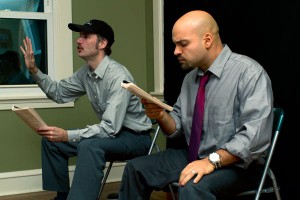Tables turn as two cops must be the ones who are interrogated in the upcoming minimalist Readers’ Theatre production of “A Steady Rain.”
The play by Keith Huff tells the story of two Chicago police officers, Denny (Junito Cubero) and Joey (Tim Perry), and the complexities of their lifelong friendship tainted by the rough city streets.

At the beginning of the show, the two find themselves on different sides of the law, but in love with the same woman. Under interrogation lights, they deliver alternating accounts of the chain of events that put their friendship and careers in jeopardy.
Danny and Joey are the only characters on stage for the entire 90-minute production. Director Anne Marie Cummings said working with such a small cast doesn’t mean the show still isn’t engaging.
“When you find two-person plays that are really well-written, it pulls you in,” she said. “You see two actors, but by the end of play feel [you’ve] gotten to know the other five or six they talk about too.”
In a reader’s-theater style show, actors keep their scripts on stage for the entire performance. There are no sets or props, just two chairs. Actors wear whatever costumes they feel are most appropriate for their characters. Typically, scripts are held up by a music stand, but Cummings said for this production, Cubero and Perry wanted more freedom.
“The actors said they really wanted the challenge of just holding the scripts in their hands,” Cummings said. “It frees them up to move more.”
Cummings said “A Steady Rain” is a character-driven play. Because the production doesn’t focus on technical elements, the core of the show has to be focused on the acting and the words. She said she chose this show because Huff’s story was so compelling.
“It’s perfect for reader’s theater because what we focus on is the written word,” she said. “It’s very intense. Because the writing is so rich, the actors don’t have to do as much as one might think.”
Cubero said playing Denny, a family man with slightly skewed notions of what constitutes honor, has been a rewarding challenge. Throughout the short rehearsal process, he said, he experimented with many variations of his character.
“It’s odd, because one day the character is a certain way, the next it can change a little bit, and fine tuning it to get the character just right is difficult,” he said.
He said what drew him to the play was the intensity of the script, and how the characters interact on so many different levels.
Cummings said one big challenge of the show was addressing the accents both characters must have.
“There’s a certain twang, a certain way of talking, for people from Chicago,” she said. “It’s been a challenge for both of them — it’s fantastic writing, but it’s been a challenge living up to it.”
Following every performance of “A Steady Rain,” Richard Polenberg, professor of history at Cornell University, will lead a discussion on the issue of affirmative action and speak about real-life events Huff dramatizes in the play.
“I explore the actual historical circumstances of the play and compare it to the way the playwright used history or embellished it,” he said.
Pete Panek, a local blues musician and native Chicagoen, adds to the performances of “A Steady Rain,” playing live electric guitar underneath the dialogue and between scenes. He said his music underscores important moments for the audience.
“It’s more like punctuation points in between what I consider really heavy sentences or heavy dialogue,” he said. “It’s in that space where I will make a commentary on what’s happening.”
He said blues music is based on call and response, so he attempts to answer what characters say in the play, adding to the general atmosphere.
“It’s almost like a guitar Greek chorus,” he said.
Panek said he’s developed a musical motif to fall in line with the title of the show, “A Steady Rain.” Throughout the show, Panek said he plays a riff in a blues minor which reappears and helps tie moments together.
For Cummings, the raw emotion and look of the show adds an element of excitement to the play.
“This is a play about love and loss, and people will hopefully identify with things that come up with family or with friends or relationships that tear you apart,” she said.




